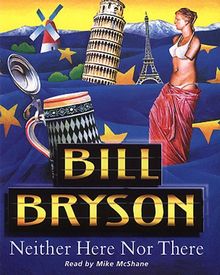Neither Here Nor There: Travels in Europe
The
book I read for the 2021 NONFICTION
READER CHALLENGE in the category Travel is Neither Here Nor There: Travels in Europe, by Bill Bryson, 1991.
I
had read a number of books by Bill Bryson, and had enjoyed them very much. His book on the English Language, Mother Tongue: The English Language, and
on American language and culture, Made in
America, were both very funny as well as informative. Another informative
and readable book is A Short History of
Nearly Everything. I also enjoyed his book, Shakespeare, even though I felt there were some unsubstantiated
claims made in it.
So
I thought it would be a good idea to choose his travel book, recounting his
1990 trip through Europe from Hammerfest, Norway to Istanbul, Turkey. The trip
he takes retraces the travelling he did with a friend when he was a student. Perhaps
because this book was written about 30 years ago and both travel and Europe
have changed so much since then, it was rather disappointing as a travel book.
In fact, there wasn’t much about it that is like a travel book – no information
about the sights, the cuisine, or the culture. He also doesn’t have many conversations
with any residents. This is definitely not a book to read to decide whether to
visit any of the places mentioned or to get ideas about what to do if you do visit.
The
book is more of a diary of his trip, with short comments and observations of
each place. There is more of a focus on how he is feeling, or how it compares
to his previous trip. He doesn’t stay in any place very long (not more than 2
or 3 days), and although he sometimes mentions museums, parks or other places
he goes to, the reader doesn’t really get a good idea of what the city is like.
He seems to spend most of his time walking, which I like to do as well, but his
observations mostly relate to whether he likes the scenery and views or not.
His other activities are drinking beer and making caustic observations about
the locals. He seems to be hungry, tired or annoyed most of the time. He never
interacts with other people in the cities he visits, never gets to know anybody,
and he doesn’t make the effort to learn more about any of the cultures.
He
is disappointed by most of the cities he visits, most of the train rides he
takes and most of the meals he eats. But it is difficult to get an idea of what
he would like. He doesn’t like Naples
because it’s crowded, dirty, disorganized, but also doesn’t like Milan because
it’s too orderly, clean and boring. He doesn’t like Hammerfest, but is sad when
he leaves because he loves it.
Almost
every city, hotel and restaurant is too expensive – but he checks into
expensive hotels just because they’re convenient and/or he is tired. I wonder
how this trip was funded. He either loves or hates a place – sometime this is
true of one place from one day to the next. If it rains, he hates the city; then
if he eats a good meal he loves the city. But what he likes about scenery,
architecture, and neighborhoods seems inconsistent.
He
mentions that, when he was a boy, a film left him with the impression that
Austria was somehow more European than the rest of Europe. “And so it seemed to
me here in Innsbruck,” he writes. “I was in Europe now.” But later, in the
chapter about Sofia, he writes that “it was the most European of all the cities
I had been to.” It seemed to me that to Bryson, “Europe” is narrow, winding
cobblestone streets with clean ‘old-fashioned’ buildings lining them, including
small shops that sell handmade artistic treasures. Or something like that. If
instead of looking for places that fulfilled some kind of European fantasy for
him, it would have been better for him to actually pay attention to the quirks
and differences of each city, country so that he could have appreciated them
more.
That
being said, many of his musings are quite funny. He doesn’t take himself too
seriously, and he gives a humorous slant to each of the setbacks he suffers. I
got the idea that he was taking this trip just to write a book – rather than to
actually experience the places he visits. There are some cultural references
that I wasn’t familiar with; perhaps they are known to British people in his
age group (eg, Jimmy Tarbuck, Andrew Neil). An oddity is that when he refers to
the movie he saw as a boy about the members of the Vienna Boys Choir, he
writes, “I believe it was called The
Trouble With Angels.” However, I
remembered a film of that title being about a group of girls in a Catholic
school run by nuns. When I checked it out, the film Bryson referred to was
called Almost Angels. It’s odd that
he wouldn’t have confirmed that while writing the book, especially since his
other books reveal that he has quite a knack for research.
Maybe
these are some nitpicking points, but as I’ve mentioned, this is not really a
travel book. It’s more of Bryson’s personal ramblings about people, train
trips, and what he likes and doesn’t like about being in a foreign country. It’s
an easy read and can be quite enjoyable if you don’t expect it to be preparation
for a trip.


Comments
Post a Comment